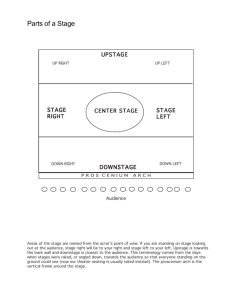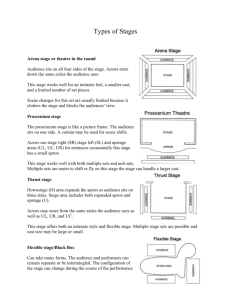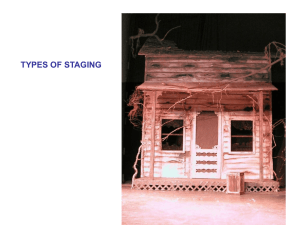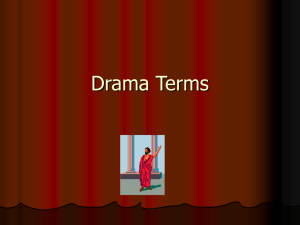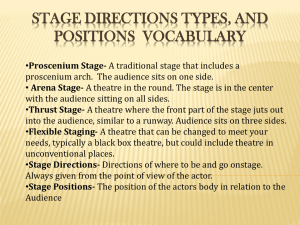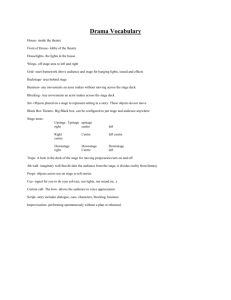Stage Spaces
advertisement
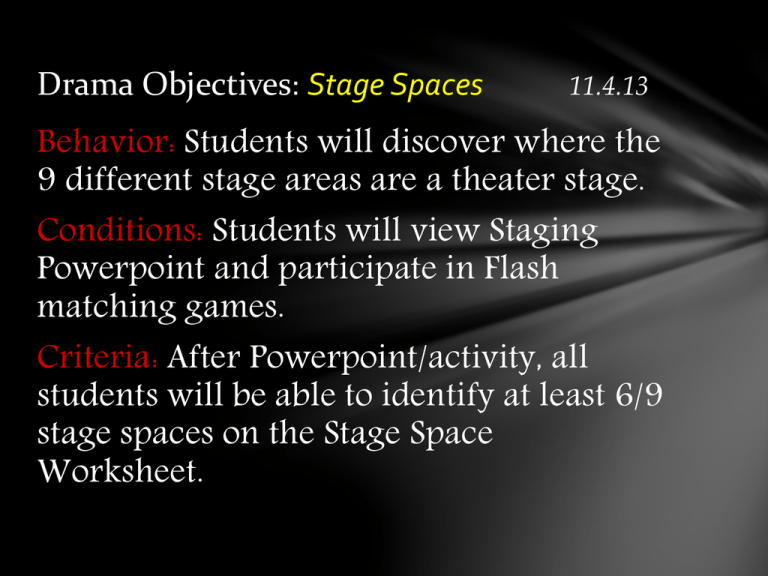
Drama Objectives: Stage Spaces 11.4.13 Behavior: Students will discover where the 9 different stage areas are a theater stage. Conditions: Students will view Staging Powerpoint and participate in Flash matching games. Criteria: After Powerpoint/activity, all students will be able to identify at least 6/9 stage spaces on the Stage Space Worksheet. 2.6.14 “How Did I Succeed” Letter Get out your black portfolio binders and make the following diagram on a new page. Stage Areas 9 basic areas Stage directions are from the actors pointof-view, facing the audience. Stage Areas C = Center C Center Stage (C) is primarily a position of great importance or prominence. Stage Areas D = Down/Downstage D C D D The down stage position is located DOWN by the audience. Towards the FRONT on the stage. Stage Areas U = Up/Upstage U D U C D U D The upstage position is located near the backstage area. Furthest away from the audience. Raked Stage • Sloped upwards away from the audience. • This improves the view for the audience. • Led to the theatre positions "upstage" and "downstage", meaning, respectively, farther from or closer to the audience. Stage Areas R = Right/Stage Right UR CR DR U C D U D Stage Directions are seen from the ACTOR’s Perspective Stage Areas L = Left/Stage Left UR CR DR U C D UL CL DL How can actors and directors utilize this knowledge of the stage space? • Precise and planned movement of actors on stage • Always taken from the actors perspective Flash Game Stage Directions Minefield Flash Game Stage Directions Stage Diagramming Set Diagramming A door opening into a bathroom far RC 2 doors opening into a bedroom far UR A small rectangular table DR with 2 chairs R and L of it A large round table surrounded by 4 stools RC A sofa UC A bookcase far UC, set against the wall 2 windows, far UC, L of bookcase Padded chair CL with rectangular side table to its R Bar table _____________________ Door________, U of ________________. Bookcase far __________________, set against__________ Couch_____________________, with ____________________________ to its __________. Assignment Tips for diagramming: – Use a ruler/straight edge and a PENCIL. – Use 4 squares per meter (roughly 1 square per foot) Grading criteria: – Clarity and readability of labelling. – Cleanliness and clarity of drawing. – Correct placement of furniture and architecture. DUE FEB 8th WRITE THIS IN YOUR PLANNER Diagram the Drama room. (the drama room is roughly 56 feet long and 24 feet wide) Diagram the following set with: – Three walls. In the U back wall there is one large window far L. – In the L wall are two doors. The D door opens out into the kitchen. The U door opens onto the stage revealing a small closet. – Against the R wall at CR is a bookcase. – In the R wall, D of the bookcase is a door opening out into a garden. – A long rectangular table CR with four chairs along the U side , one chair at the L end of the table, and one chair at the R end. – A desk DL with a chair at it, facing L and another chair U of the desk facing R. Proscenium or Picture Frame Arena or Theater in the Round End Stage or Concert Hall Thrust or Elizabethan Proscenium Proscenium • The most common style of staging. • Traditionally the playing space is hidden by a curtain. • The farthest downstage plane is where the imaginary 4th wall is. • 4th wall: The opening into the world of the play. If you imagine playing space as a room with 4 walls, 3 of them are visible, but one is invisible, allowing the audience to witness the action of the play. Thrust Thrust staging •What does thrust staging require of the actors? –If playing on the thrust, actors must remember to turn toward various parts of the audience during the course of a scene. –In vocal terms, the actor must project more when on the thrust, as there is little acoustic help from the architecture of the auditorium. ARENA Arena staging The playing space is surrounded on all sides by the audience. Entrances often consist of aisles through the audience. Used to give the audience a sense of intimacy/close connection with the production.
